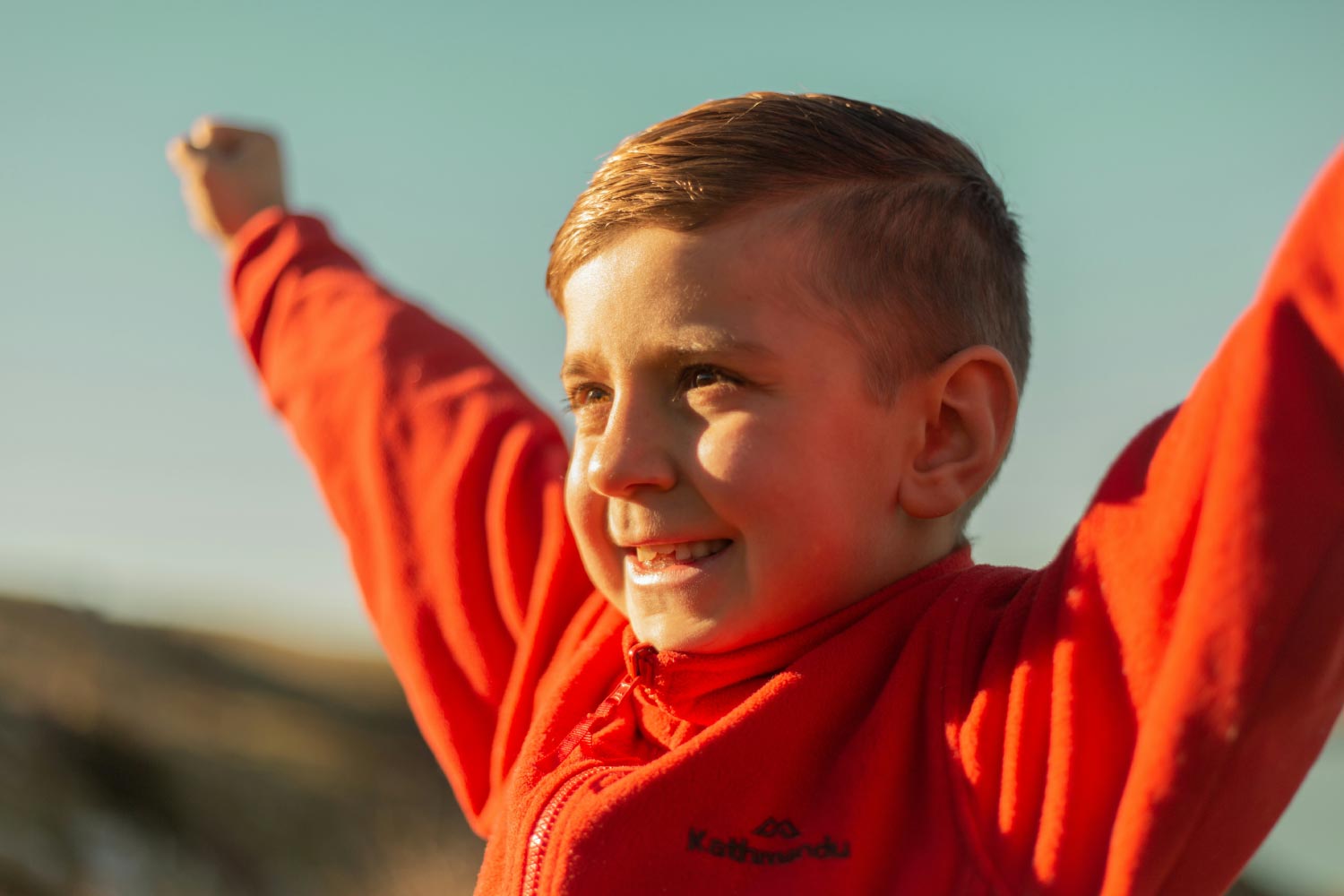“I did it. I resigned. I quit!” Tears had wet my face even before I called Klara to tell her. … I felt so relieved by saying it to her out loud!
It was December 8, 2005, and I was driving home to Badhoevedorp after a meeting in the vicinity of Utrecht. It was dark and raining, the road was glistening. Combined with the tears, I had to concentrate on my driving. We did not speak much, but we stayed in touch through the telephone connection, throughout the drive home.
How did I get here?
Nearly 28 years before, I started working for KPMG, as a youngster, straight from University, 21 years old. First as a software engineer, and before I knew it, I commenced developing my leadership skills in roles such as team lead, manager and senior manager. I loved my work. Klara and I got married in 1980 and started our family (two wonderful sons) soon after that. Life showed me the way and was easy. I must say, in hindsight, I lived my life on a not-too-high level of consciousness. It just happened, I was content in my work, Klara took care of the kids and we were happy and wealthy to be able to have what we wanted. The work environment was wonderful: challenging assignments, great colleagues and always people around me who showed me the way.
When I was 26, my father passed away very suddenly. A heart attack. I was devastated and did not really know how to handle this event, other than by putting even more energy into my work. Life just continued. No questions asked.
I travelled a lot for business and loved working together with others on the most challenging projects. And while people still saw me as “the technology guy,” I was step-by-step realising it was not so much technology that made me happy, but people. Making my teams work. I remember holding a Christmas speech to my team, about a hundred at that time, and telling them what I felt: “If we start a shipyard tomorrow, we will be successful in that as well.” The funny thing is that only years later, I started to realise what this message actually told me: with a good team of motivated people, anything is possible and fun!
Looking back at those roughly 30 years of working in the consulting business and 50 years of living, I now realize that there were people around me regularly, who fed me with advice, questions or behaviour that helped me find my way in life. Let me share some.
Who showed me the way?
To me, the best way to learn has always been through guidance from a mentor. Of course, my dad was my first and best ever mentor. He taught me about right and wrong, about revenue of working hard, and that anything can be done or made if you set your mind to it. But the most important value I developed through his guidance, is the importance of togetherness, of connection through the heart with other human beings. He was loved by the people in his team, for who he was. He showed me the way.
My great friend Han, with whom I stayed during summer holidays as a youngster and during adolescence, also was a role model. I recall…working on his farm and camping in the countryside during the daytime; discovering new friendships, nightclubs, and alcohol at night. Han gave me trust in being good at what I was good at. He let me explore and expand my limits. Enjoying life next level. He showed me the way.
At work, it was my first boss, Herman, who showed me the way in his particular style. He was a partner at KPMG and always full of energy and new ideas. He loved technology and was regularly judged by his colleagues for spending company money on the newest technologies and pushing his team to test them to the limits and see what was possible. This was why I was involved in the development of the first-ever commercial chipcard application in the Netherlands, and in professionally hacking the Dutch banking system to prove their weaknesses; assigned by the Dutch National Bank, of course. I loved those projects, doing the most challenging things as a team. Herman taught me to do first and ask for forgiveness afterward, instead of asking for approval upfront. He showed me the way.
In the late 80s, I was asked to set up a new consultancy practice in telecommunications, and I did, with a lot of help from the people around me. One of them was another Herman. In my eyes, an old and wise man.Technology engineer and business advisor, with a vast amount of experience in large-scale infrastructure and telecommunications projects. He was my personal coach for two years, supporting me in setting up this new business. In my view, he was stubborn, sometimes grumpy, and never satisfied with my answers, never a compliment. And with that, he taught me the importance of always looking for opportunities for improvement, not to settle for mediocre solutions. I learned to ask myself the questions I hoped others would not pose to me. To challenge me before others did. He showed me the way.
So, what made me do it?
Around the turn of the century, the world of accountancy and consultancy was in turmoil. The Enron affair – about the segregation of responsibilities of financial auditors and business consultants – triggered a fundamental change in the consultancy industry. As a result, KPMG decided to sell its consultancy business to IT Outsourcing giant Atos Origin; and us, employees and partners with it. I was one of those partners, and loyal as I was (am), I moved with my team to this new business environment. I felt it as of Day One: a culture of fear, of individual targets, of personal success, in which failure is not an option.
I tried to blend into this different culture, adapted my behaviour. As was expected from me, I focused on realising short-term revenue, on sales and on my weekly reports, on getting my figures right. In hindsight, my attempts to be the tough, result-focused manager must have looked pathetic. I did it because I had the feeling of being forced to do so, not having a choice. Although I was not good at it at all – which showed in my results – senior management let me continue, probably because they liked me, I was a nice guy. But I never asked.
Soon after August 16, 2002, the day of the takeover, I found an opportunity to use my strengths in team building and recreating some of the old KPMG-culture. An internal training programme on personal leadership, team development, and customer focus that we had run for years before the takeover could be dusted off and reintroduced to get back to some of the old feeling, to which so many consultants hungered. Together with some dear KPMG friends, we did it. In a couple of weeks, we redesigned the programme (most important criteria: under the radar, no cost involved, no impact on billable hours) and found a low-cost training environment (a refurbished pig stall in the countryside). Just these activities alone generated a buzz of excitement among the consultants. “Is it true, will the Core Skills training really be there again?” And we managed to run a number of those programmes, one every two months, asking participants to take care of their billable hours and to give up their free Saturday. It was a great success; it recreated the feeling of togetherness, of being seen and being part of creating a great culture. As a partner, I was responsible for the programme, budget, and, in terms of delivery, logistics and the lot. And I loved it. Energy flowed. When people asked me how I was doing, I started talking about this training programme and its impact. I forgot to talk about the rest of my work, my prime responsibility managing revenue, risk, and spreadsheets.
One day, a dear colleague and friend (still working with her today) asked me this same question and mirrored: “Hey, Hans, if you’re talking about Atos business and your responsibilities as a partner in the firm, I feel a heavy load, but as soon as you start about this training, your eyes start to glisten. Isn’t it about time to listen to your heart?” This remark took me by surprise, but it made me aware of what was happening. The balance of “must-dos” and “want-to-dos” in my work was not level, far from it.
A few weeks later, December 7, 2005, I was in Arnhem, a city in the eastern part of our country. A strategy consultant and I delivered a workshop with the board of NOCNSF (the Dutch chapter of the Olympic Committee) and it was awesome. Energy flowed, the board members were thrilled and motivated and we over-achieved what was intended. Later that morning, we drove back to our Utrecht office, happy with the result, together in my car. In my mind, we were just chitchatting, but suddenly he said to me: “Hey, Hans, why don’t you quit your job, take some time off, and then find your new challenge with the old KPMG or one of the other consultancies?” This remark really took me off guard. What signals was I giving? What had I said to make him say this?
Back in the office I found myself a cubicle to work, called one of my dearest colleagues with whom I had been working closely in redesigning and delivering the Core Skills training programme, and asked her whether she had time for a coffee and chat. She had, as always. After two hours talking, she left the room by saying, “Tell your secretary you’re out for the rest of the day, and you take time to think, think hard.” I did, and the next day, I told my manager, the leader of our consultancy practice, “I quit.” With resigning in December 2005, it was me, telling myself what to do.
I had learned to listen to myself, to dare and act on what I needed, what I felt was best for me. And that same moment it was so crystal clear to me what I needed: space. Room to maneuver, room in my head, and – I see it clearly now – room in my heart.
I sent my resignation letter a few days later; it was titled: “Space.”
Visualizing the next chapter
During the weeks following my resignation – I was asked to keep it a secret until early January – I took time to reflect and think about what I wanted next. I felt my energy level rise and I started to think about what to do. What is important to me? Which values drive me? Should I go and become a partner at one of the other consulting firms or to KPMG? It did not feel good, not again this same process; I had seen it, done it, got the T-shirt. Or should I do something else? The answer came to me very clear: I am on this planet to help other people, people like to be around me and trust me, confide in me; I like to have the freedom to do so in my way, on my terms, following my heart. The collateral and approach of the Core Skills training, based on self-organisation and experiential learning would be a great foundation to start from. And I also knew for sure, that I never wanted to work alone. That’s not me. I want to work together with others and I know I am good at it.
So, I want to work together with others and in direct contact with those asking for my help, because I love being around others, and I am good at bringing the best in people to the surface.
Curiosity is key to me. I honestly hate it when people make assumptions and judge others or opinionise based on those assumptions. The world would definitely be a totally different place when people, leaders to start with, would think and act based on curiosity instead of opinionising first and then looking for confirmation. Therefore, it was clear that my way of working should be about letting people discover the power of asking questions, to themselves, and to others.
And chatting with Klara about these results of my brainstorms on the purpose, focus, and name of my new business, she said: “Why not use some Latin words, since that language is part of your education?” Through that, Rogare was born. My own company! Rogare is the Latin verb for asking questions. No better word than that, in describing what was important to me. A week later, I had my logo, business cards, and rudimentary website. With the help of a lot of lovely people, of course.
One of the commercial banks in our country uses the slogan “Follow your heart and use your head.” I love it, especially the order. First, listen to your heart, and then subsequently – of course – use your head. My purpose is to stimulate people to listen to their heart, or to put it differently: always use the filter of their heart, in observing, deciding, reflecting. When I said goodbye to my colleagues on February 28, I had a short speech and a sweet treat for each of them, which is the typical way to celebrate in the Netherlands. I had it specially made: a piece of pastry (“gevulde koek”) in the shape of a heart. That was my message and wish to my colleagues and to the company.
Reactions on my announced departure of the colleagues and friends around me were all positive and heartwarming: they understood, wanted to stay in touch, and quite a number shared that they thought it was brave to quit my job and become self-employed. Clients were informed about it as well. And a number of the clients I had been working with expressed their preference to continue working with me! All this positive feedback gave me a wonderful feeling; my self-esteem lifted.
Impact
About five weeks later, on a Saturday afternoon in mid-January, we were all home: Klara, both our sons and some of their friends. Pot of tea and cookies on the table and all of us sitting around, having fun, uncomplicatedly joking, laughing. Then Bart, our youngest and 20 years of age, rises from his chair, comes to me and hugs me intensely. He says: “I am so glad that I have my father again.“ That remark goes straight to my heart and will stay there forever. Was it that bad, in the past months, years? Had I been too occupied with my own issues that I hadn’t been there for my family? I will be forever grateful to him for expressing his feelings. If I had ever been in doubt whether I had taken the right decision, now I was 1,000 percent sure. I learned how important it is to regularly check my connection with the people around me, the people I love, the people I value.
What also helped me make the decision?
Long before that evening in the rain, I knew that I would not stay and work for Atos for another 25 years. Why? Because I had to do my best to do what others wanted me to do. Focus on short term turnover, on earning as much money at the lowest possible cost. I felt the pressure to perform, but not the support nor atmosphere to cooperatively work towards results in which we jointly believed, in a way we strongly believed in.
Two years before I left, I was invited to join a personal leadership program. The outcomes were two possible scenarios for my future, prioritised clearly. The first was to move to another country for a couple of years, a slumbering wish I had for some time. The business consulting practice in Spain was small in those days and together with my Spanish colleagues, I developed a business plan to grow that practice. The business plan included a seat for me in the management team. It got serious; Klara and I went to Madrid, to explore the city, the local living, and housing. One thing we realised during that exploration: when we would move to and work in Madrid, my salary would be roughly half of what I earned in the Netherlands, and you know, we both knew that that would be enough as well. The approval by the Spanish board of the business plan was stalled and stalled. In July 2005 there was still no decision; I decided to ask for a Yes or a No. Spanish culture is not so good at answering that question in a straightforward, Dutch way. But there was not enough support, so it was a No after all. I stopped the initiative. Sad at one end, and rich because we had realised that we could do with a lot less and would still be rich. This insight helped me a lot to step out of my golden cage a few months later.
Living my purpose
I am on this planet to help other people, that’s what I feel very strongly, and it helps me to express that out loud when introducing myself to the people I work with. And how do I do live my purpose? By checking the impact my interventions will have on others. Explore the questions that they have, whether personal, organisational or on a team level. Which change do they want to achieve? Guide them in a process of experiencing their desired situation step by step; let them reflect and experience it again: learning by doing. Individually, and in teams.
Regularly check expectations. Yes, that’s what I do. However, living my purpose is far more about how I best do it. And I have learned in those first 30 years of my working life what I am best at. First of all, I have learned that I can best (or only) help others if I take good care of myself. So, checking what I need, assessing how I feel in interaction with others, and recognising and valuing my boundaries. By showing myself, opening up and being vulnerable, those around me are invited to open up as well. This way, it is easy for me to connect with others, which makes it easy for others to trust me and feel safe. My impact is best when I feel the connection on a heart-to-heart level. Then I feel free to confront, mirror, listen, to do what’s needed. Exemplary behaviour is powerful. That’s what I want my clients to discover, so I’d best show it myself, as well, in my role as coach, trainer or facilitator.
I love working this way. And honestly, it does not feel like work at all. Regularly I am asked to facilitate teams in their search for better performance and to coach people. The earnings are good, and that way I have the freedom to also help people straight from the heart, without financial reimbursement. Via Rotary and other institutions and networks. Money or no money, the most beautiful gift I can receive from the people is that they leave with a smile on their face, with a different look in their eyes, a different colour on their faces. That’s my humble way of contributing to a better world.
Now, over 13 years later, I still find it difficult sometimes to decide without thinking, “What will others think of it?” But by now, I have learned not to take myself too seriously and freeze, not to stall, not to be afraid about what others will think, but instead make sure that I dare to be honest to myself and sincerely answer the questions, “What do you think of this? Is this what is really necessary? Is this the right thing, or the easy thing?” myself!
Wealth is not about money at all, it is about happiness and making a difference, to have an impact and to feel seen. If people approach me to be coached or otherwise ask me to accompany them in their development for a while, I feel seen and grateful for that. And what I also learned is the closer people are to me, the stronger the heart-to-heart connection, the stronger the gratitude.
Winter 2010 I was in my car driving the A2 heading for home. My son David called. “Dad, will you please help me?” He had finalised his Ph.D. and had scheduled his promotion ceremony, sent out invitations nationally and abroad. All set, he thought. And then, out of the blue, one of his promotors called and proposed to promote him “cum laude,” but he was a bit (too) late in commencing this procedure and therefore asked David whether he would like to postpone his ceremony. I felt his struggle strongly. How unfair to ask this! What should he do? And what could I do to help him? I asked him what the options were, and what was most important to him. And we explored the pros, cons, and options. Some 10 kilometers down the road he found his answer. The “cum laude” label was less important to him than getting this ceremony over and done with. David decided to tell his promotor that he would stick to the original date and took the risk. He thanked me for listening, and I shared my gratitude with him that he had reached out. Wow.
My purpose is to help others. So, I am grateful to experience that people ask me to do exactly that. Help them in finding their path, help their team to find a better way to collaborate, help their son or daughter to explore what their future would look like. And most grateful I am for being able (and allowed) to be there for our sons, and their partners and children. To meet them where they are, walk along their sides and ask the odd question. From the heart.

Hans Veenman
Leadership Companion, The Netherlands






